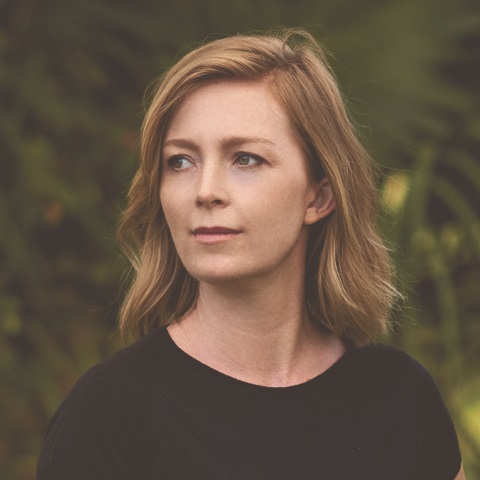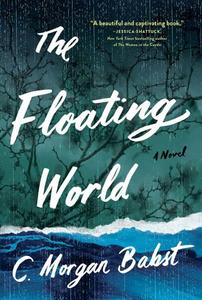
|
|
| photo: Craig Mulcahy | |
C. Morgan Babst is a native of New Orleans and studied writing at the New Orleans Center for Creative Arts, Yale and New York University. Her essays and short fiction have appeared in Garden and Gun, the Oxford American, Guernica, Harvard Review and New Orleans Review, among other journals. The Floating World (Algonquin, October 17, 2017) is her first novel.
On your nightstand now:
The Futilitarians by Anne Gisleson: This brilliant memoir by one of my first writing teachers is both deeply intellectual and emotionally raw.
Tin House: True Crime: Tin House is one of my favorite journals. The marvelous Claire Vaye Watkins is in this issue, talking about stealing beauty with her mother as a child.
Boy with Thorn by Rickey Laurentiis: I read this book of poems cover to cover one rainy day, and now I am reading them again. They are corporeal and fierce.
We Are Never Meeting in Real Life by Samantha Irby: Does it count if I'm listening to it while I fold the laundry? I'm loving this outrageous and funny audiobook.
Favorite book when you were a child:
Lafcadio, the Lion Who Shot Back by Shel Silverstein: I mean, he has a tailor make him a marshmallow suit! And I think I still have red wool from the hunters' caps between my teeth.
Your top five authors:
Five is not enough. Here's a relatively random 10:
Mikhail Bulgakov
Anne Carson
William Faulkner
Vladimir Nabokov
Maggie Nelson
Flannery O'Connor
Virgil
Jesmyn Ward
Virginia Woolf
Richard Wright
Book you've faked reading:
This is a very long-held secret: no one in my AP English class read Conrad's Heart of Darkness. We tried, but we decided it was like wading through mud, and so we quit en masse. Then, everybody plagiarized their papers (literally, everybody--it was a conspiracy). I was the only one who didn't get caught, because I plagiarized mine from a different source. I felt so bad about it that I proceeded to suffer through three separate required readings of Molloy (if Conrad is mud, then Beckett is tar), but I've still never read Heart of Darkness. Both times my husband has tried to make me watch Apocalypse Now, I've fallen asleep halfway through.  Book you're an evangelist for:
Book you're an evangelist for:
The Notebooks of Malte Laurids Brigge by Rainer Maria Rilke (translated by Michael Hulse): This is Rilke's only novel--a brilliantly (pre)post-modern heartbroken howl of a book--and most people don't know it exists. This semiautobiographical false document ranges from existential dread beside hospital walls in Paris to the ruin of Brigge's ancestral home and ends with a retelling of the parable of the Prodigal Son. Among the heartbreaking images of house-ghosts and girls with half-buttoned dresses are revelations about home and love that changed the course my life.
Book you've bought for the cover:
Wolf Hall by Hilary Mantel: I wanted that book with my body--I was hungry for it. Looking at it now, I can't see what precisely I was so excited about--maybe it was the quality of the red.
Book you hid from your parents:
My parents are not the kind of people you have to hide books from.
Book that changed your life:
Citizen by Claudia Rankine: Being invited into the intimate experience of racism through the shifting, multivalent "you" in these poems was absolutely revelatory. If, after Katrina, I'd begun the process of waking up to the real story of race in America, this book was the cold shower that got the sleep out of my eyes. Copies of this book should be dropped from crop-dusters across the country.
Favorite line from a book:
"I am thinking of aurochs and angels, the secret of durable pigments, prophetic sonnets, the refuge of art." --the penultimate sentence of Lolita by Vladimir Nabokov
Five books you'll never part with:
After a decade and a half of frequent moves and tiny apartments, I finally have a library big enough for all my books, and you're telling me I only get to keep five? I will never part with any of them again. But I will tell you what I took when I evacuated New Orleans the day before Katrina:
The Master and Margarita by Mikhail Bulgakov, translated by Diana Burgin and Katherine Tiernan O'Connor (the Pontius Pilot scenes dog-eared)
If Not, Winter: Fragments of Sappho, translated by Anne Carson (primarily for fragment 94 and the longing inside the brackets which tell us where the original papyrus was torn)
Kristin Lavransdatter by Sigrid Undset (a beautifully bound 1961 edition given to me by my parents' best friends)
The Sound and the Fury by William Faulkner (a second printing, found in a used book store for $5, with hand-cut, vellum-soft pages that altered the way I think about narrative)
Ada and Pale Fire by Vladimir Nabokov (Ada still annotated and Post-It-noted from my college thesis; Pale Fire rumpled from a boat trip off Cancun)
Moby-Dick by Herman Melville (the cheap paperback copy I'd used to kill ceiling mosquitos when I lived in St. Petersburg)
These were all books that, for various reasons, had traveled with me for some time. I also evacuated with my favorite pair of shoes (painted floral stilettos).
Book you most want to read again for the first time:
Our Lady of the Flowers by Jean Genet: I was so confused when, as a life-long Catholic schoolgirl, I picked this up at the age of 16. I thought it was going to be about the Virgin Mary. Instead it's a book about death and sex written on toilet paper while Genet was in prison. I would love to read it again now, properly prepared, but every time I've tried, I get distracted by how baffled I was as a virginal teenager by what Sartre called "the epic of masturbation."
Book you're itching to get your hands on:
Appropriate and Other Plays by Branden Jacobs-Jenkins: I ordered this book from my local bookstore last spring when, over a year after having seen a production of Jacobs-Jenkins's An Octoroon, I found I still couldn't get it out of my head. Jacobs-Jenkins is obviously a genius, and I'm dying to read the other plays, but they keep pushing back the pub date! It's driving me crazy.

